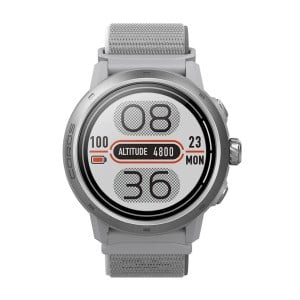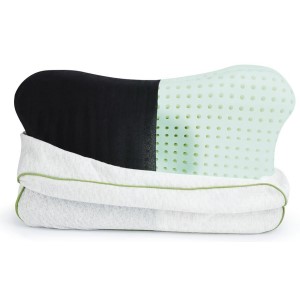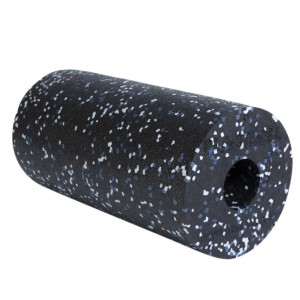7 Sustainable Tips To Improve Your Sleep
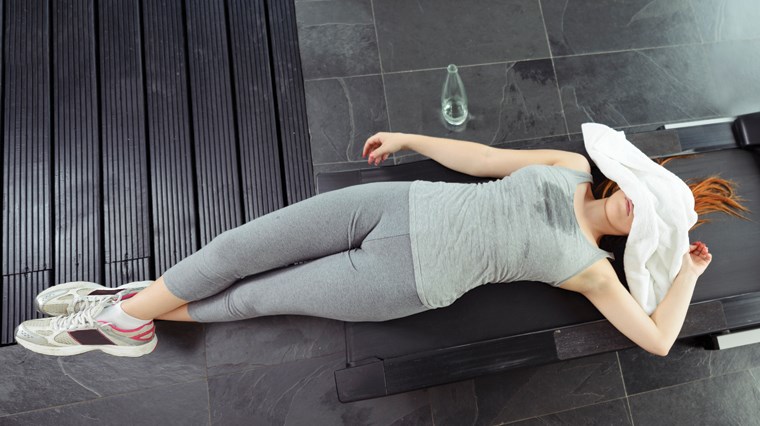
A good night’s sleep is irreplaceable. Quality sleep improves your running performance, but it goes far beyond that. Quality sleep improves your quality of life.
Sleep isn’t a time-waster – you need sleep to survive, to build muscle and to support healthy brain function. With increasing awareness of the importance of sleep on your performance, recovery and everyday life it’s natural to ask, how can I improve my sleep?
On the flipside, being sleep-deprived takes a toll on both your muscles and mind and the stress of trying to make yourself fall asleep can itself be an obstacle to gaining quality shut-eye.
To take the pressure off, we’ve put together a list of practical and sustainable sleep tips to create a bedtime routine that will help you drift into sweet slumber and wake up fresh and rejuvenated for an action-packed day.
These sleep habits form what is commonly referred to as sleep hygiene – the little things you can do to create a healthy sleep environment within your own mind, body and your home.
1. Enjoy exposure to natural light during the day & limit screen time at night
Your ‘internal clock’ or circadian rhythm refers to the physical, mental and behavioural adjustments that occur within a 24-hour period, regulating the natural sleep-wake cycle of your body. Your circadian rhythm keeps you energised during the daylight hours and more tired at night. Although not everybody is the same (e.g., 'early rises' versus 'night owls'), adults should ideally aim for 7-9 hours of sleep per night.
Also called the 'darkness' or ‘sleep’ hormone, melatonin is produced by the pineal gland in your brain and has a crucial role in maintaining a healthy circadian rhythm. When the retina of your eyes are exposed to lower light levels or the darkness of the evening and night, a signal is sent to your pineal gland to release melatonin. As your melatonin gradually increases, your body is put in a state that’s more receptive to sleep. However, using electronic devices at night like your smartphone, laptop, e-reader, tablet or television exposes you to blue light, disrupting this secretion of melatonin.
But blue light isn’t the villain in your sleep story. In fact, the sun itself is a source of blue light (light with a shorter wavelength and higher energy compared to other colours in the visible light spectrum). Exposure to sunlight while walking and jogging outdoors, or at the very least, setting your laptop up by a window – helps increase your alertness during the day and naturally encourages you to wind down during the evenings. Blue light can also increase your emotional vitality, stimulating the secretion of the mood-boosting hormone serotonin and helping stabilise your mood.
Timing is everything. Your brain can’t distinguish the difference between the energy-boosting natural blue light of the sun during the day and the artificial blue light that keeps you restless at night.
Even if you find scrolling through social media soothing after a long day, it’s important to limit screen time to no more than 2 hours at night, and reduce the brightness levels on your devices. Schedule in the 1 – 2 hours before your bedtime as ‘screen-free time’ – but don’t see this as a punishment! Use this time to prioritise your self-care – do a calming hobby, listen to music or enjoy other meditative activities.
2. Limit caffeine & alcohol before bed
No surprises here – that energy-boosting cup of coffee or tea in the morning can wreak having on your sleep cycle when enjoyed closer to bedtime. Coffee, tea, soft drink – even chocolate (particularly dark chocolate) – all contain the stimulant, caffeine.
Caffeine elevates your cognitive function including your focus, mood and memory. This spike in energy provided by coffee or tea can be valuable during the day, but have negative consequences at night and inhibit your ability to gain quality deep sleep.
Everyone has varying levels of sensitivity to caffeine. It’s recommended that you avoid caffeine 3 – 7 hours prior to your bedtime, or reserve that cup of energy for the morning only.
Alcohol is also best avoided in the 3 – 4 hours before bed. As a depressant, it slows down brain function, making you feel drowsy and causing you to fall asleep more quickly. However, quality sleep is key and alcohol has a tendency to make you more susceptible to waking during the night.
When alcohol is metabolised by your liver, its sedative effects decrease and you’re more likely to drift in and out of sleep. It may cut REM (rapid eye movement) sleep or the ‘dreaming’ phase short, which is responsible for healthy cognitive function. You may experience ‘brain fog’ the following day and find everything from retaining memory to achieving a positive mood out of reach.
Water is key to all life on Earth, but even it can disrupt your sleep if you tend to gulp water before bed to catch up on the hydration you missed during the day. These hydration tips and hydration strategies for short and long runs can help you drink water regularly throughout the day as part of your everyday health, sports nutrition and to support your recovery from the inside out.
If possible, avoid drinking large quantities of water in the 2 hours before bed or eating a large meal within the 3 hours before bed (a light, healthy snack closer to bedtime may work for you). It’s about feeling hydrated and satisfied without having a wake-up call from your bladder in the night or suffering from indigestion or heart burn when you lie down to sleep.
3. Invest in a sports watch with a sleep tracker
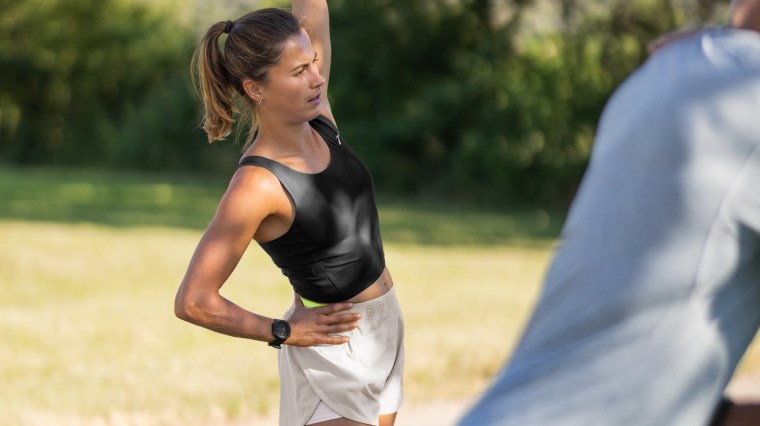
In this technological world, runners love data. From the RunDNA running gait analysis at Sportitude Running to learn more about your natural biomechanics and what running shoe is right for you, to sports watches that boost your knowledge of your run stats and the metrics on how you sleep.
Many sports watches feature an in-built motion detector called an accelerometer that can track your movements during sleep and/or a heart rate monitor for increased accuracy. An algorithm is then used to measure the quality of your sleep - estimating how long you’ve taken to fall asleep, whether your sleep was disrupted and the duration of each sleep phase.
Although sleep trackers are not a cure for poor sleep in themselves, the data they provide can suggest whether you should adjust your sleep habits to crush your sleeping (and performance) goals, and potentially offer insight on whether your recovery strategies meet the demands of your training load.
This wearable technology isn’t just for elite athletes either – it’s for everyone that sleeps – helping you prioritise your overall health and wellbeing.
The Coros Apex 2 Pro Premium multi-sport watch features a sleep monitoring function so you can build an understanding of your sleep history over time and make connections between how changes in your lifestyle or fitness routine can influence your quality of sleep. It gathers information on not only when you fall asleep with surprising accuracy, but provides an overview of your REM, light sleep and deep sleep phases, presenting the data on the sports watch and as a user-friendly graph on your smartphone when syncing with the COROS app.
Advanced features including wrist heart rate measurement and oximeter (measures oxygen saturation of your blood) help you know your body better. It also has adventure-ready features to know the world around you including a compass, thermometer, altimeter and barometer.
4. Make your bedroom your sleep sanctuary & create positive sleep cues
Your bedroom should be a serene space that your mind and body associates with sleep. It’s important that your behaviour reinforces the fact that bed is for sleeping – as whether intentional or not, the little things you do train your brain to make connections between your environment and its purpose.
In the same way that you’re more productive working in a dedicated workspace that’s free of distractions, your body and mind will feel more natural winding down and sleeping in your bed when it’s for exactly that. (Although, you can make an exception for these bed-friendly rejuvenating yoga poses.)
For example, watching television in bed at any time of day is counter-intuitive to nurturing a tranquil sleep space. It’s about creating a calming setting as you prepare for your head to meet your pillow for the night.
You may find keeping a clean, uncluttered bedroom helps lift clutter from your mind as you turn in for shut-eye. This may mean tucking the sheets in first thing after you wake up, to create an inviting environment for future you as you return to bed that night. Again, it’s the little things that can make a huge difference. Getting cosy in your pyjamas, brushing your teeth and having a fixed bedtime can act as positive cues for your body and mind to transition into ‘sleep mode’.
Of course, your choice of pillow is an essential part of designing your sleep sanctuary. Pillow preferences vary among individuals with multiple factors to consider including the density (soft or firm), height, shape, size and filling. What's beneficial to your personal comfort, won't necessarily be the same for your partner.
Matching your pillow to the type of sleeper you are (side sleeper, back sleeper or even stomach sleeper) is also critical. Made of breathable memory foam, the Blackroll Ergonomic Memory Foam Recovery Pillow contours to your body no matter your natural sleeping position – providing support where you need it and helping alleviate tension of the neck and shoulders.
Its space-saving design means even if you’re travelling – for work, a holiday or to tick off the next race in your marathon bucket list – you can take this essential piece of your sleep ritual with you. This creates a sense of familiarity and encourages a harmonious snooze session at or away from home.
5. Block out (or tune into) your senses
Your exposure to sound and light can have a dramatic influence on your quality of sleep. Most people prefer silence as their soundtrack to sleep – although this isn’t always possible to achieve, particularly in built-up areas where road noise or the cacophony of the city can be an unwelcome guest in your home.
This is where sleep apps can be a valuable resource - allowing you to drift to sleep with the natural sounds of ocean waves or rainforest as a soothing presence in areas of noise pollution. Alternatively, you may prefer to listen to white noise or a personalised sleep playlist (think calming songs) to mask the disruptive sounds outdoors and ease you into dreamland. Ensure any sound or music played at bedtime is low volume and preferably on a timer to avoid waking unexpectedly in the night.
In terms of managing light levels, powering down your devices at night is a valuable step as we touched on earlier. You can also dress your bedroom with blockout curtains or wear an eye mask to shield out external light sources like streetlights or even the moon on a particularly bright night. If you need a little light in the bedroom as you prepare for sleep, keep the room dimly lit only to help create a sleep-friendly scene.
Alongside what you can (or can’t) see and hear, your olfactory sense or sense of smell also can contribute to creating a positive sleep environment in the form of aromatherapy. Although there is much we don’t know about essential oils, studies suggest that lavender has anxiolytic (anxiety-relieving) properties and can improve sleep quality – easing your body and mind into a natural calm and promoting relaxation.
There are many ways to include this sleep sidekick into your routine. Consider adding a few drops of lavender diluted in a carrier oil to your pre-sleep bath, applying a lavender scented moisturiser to your skin, or using a diffuser in your bedroom for about 30 minutes before bed to uplift the air with the calming scent.
However, be sure to consult a healthcare professional for guidance on essential oil safety, particularly during pregnancy or around infants and children – and be aware that essential oils can be toxic to pets, so please do your research prior to use in your home.
6. Know the relationship between temperature and quality sleep
The moment you slide into bed, you want to be cocooned in comfort – and your body temperature is a fundamental part of that. Cooler bedroom temperatures are generally preferred to transition your body into ‘sleep mode’ and maintain quality sleep throughout the night.
Ideally the temperature of a bedroom should be between 15°C – 19°C for adults and 18°C - 22°C for babies, as their bodies cannot regulate their temperature as efficiently (your baby’s bedding and clothing are also important factors to consider).
As your body winds down in the 2 hours before bedtime, your internal temperature drops as much as 0.5°C -1°C, with the heat escaping through your extremities (hands and feet), and your melatonin levels increasing. This natural cooling or thermoregulation serves as part of your circadian rhythm – essentially acting as a trigger to make you sleepy.
Taking a warm (not steaming hot!) shower or bath 1 – 2 hours before bed not only is relaxing and rejuvenating, but can support the science behind sleep – reinforcing the natural cooling of your body as your temperature drops. This will encourage you to drift into sleep more quickly and reduce restlessness during the night.
All Aussies can relate to being woken up sweaty and disgruntled during a scorching summer night. When the ambient temperature in your bedroom is too hot, your body can’t cool itself as efficiently. The discomfort from severe temperature leads to restlessness, interrupting your sleep, with the deep sleep phase of REM sleep – responsible for cognitive function including learning, consolidating memory and emotional wellbeing - being particularly sensitive to heat.
Alongside ambient temperature which can be managed with air conditioning, your choices of bed linen can affect your body temperature and therefore your sleep quality. Cotton sheets provide natural softness and are a breathable sleep essential all-year round, but opt for lighter styles in the summer. In winter, dressing your bed in layers is key – similarly as to how you’d dress your body in layers as per our autumn layering guide for runners.
For your bed, this means dressing it in a fitted and flat flannelette sheet (for a fluffy brushed texture), a blanket/quilt made of winter-ready fibres (e.g., wool or vegan-friendly bamboo), another flat sheet over the blanket for an insulating effect, and a cosy throw or bed cover if needed. If you find yourself becoming too warm, it’s easy to strip down a layer to find that sweet spot in temperature.
7. Run!
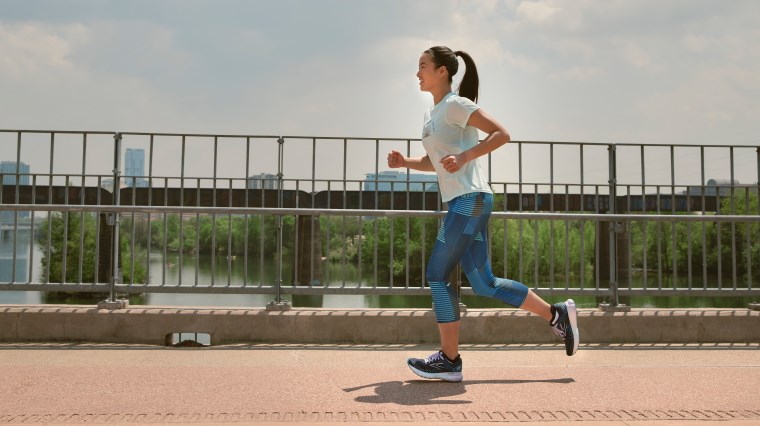
As advocates for the positive benefits of running on your mental health, we couldn’t leave this one out! Running has multiple benefits on your sleep quality – and there’s much more to it than simply re-aligning your circadian rhythm by making your body fatigued.
By stimulating the release of feel-good endorphins, running can ward off the stress and anxiety that leads to a restless ‘busy brain’ at night. However, even positive stimulation can keep you awake at night - and that’s why timing is essential.
If you love to run at night by putting these visibility essentials into action, it's recommended that you do so no later than 1 – 2 hours prior to tucking yourself into bed. This ‘buffer’ period gives your brain time to flow into a calm, pre-workout state to encourage relaxation. Including slow, gentle motion during this period like light stretches or foam rolling with the eco-friendly products below from Blackroll also encourages a calm state of mind.
Alongside the increase in mood-boosting hormones, running elevates your core body temperature – making you feel energised. It’s during the 30 – 90 minute recovery period following your run that your temperature decreases, with this natural cooling supporting the restorative deep sleep phase (slow-wave sleep) of non-REM sleep that’s essential to healing. It’s an effect similar to taking a warm bath or shower before bed, which then allows your body to cool down and mind to relax.
If you’re not a fan of running at night, no worries! Any moderate aerobic exercise - whether day or night - like running, brisk walking and cycling all have benefits to your sleep quality. The secret is to exercise regularly to flow into a consistent routine and form a healthy habit.
Your body and brain thrive on routine. Although there’s no one miracle remedy to achieving the perfect sleep, you can trial these healthy sleep habits, discover what works for you and design your own rejuvenating sleep ritual to support your self-care.
If you’re struggling with insomnia or sleep deprivation, please consult your primary care physician or a sleep disorder specialist.
Happy running and sweet dreams!
If you liked this you'll love:
How Quality Sleep Makes You A Better (And Happier) Runner
Magnesium Is Good For Muscle Cramps, Sleep & Recovery. Here's How To Get Enough.
Sports Nutrition: Healthy Carbs, Protein & Fats To Improve Performance & Recovery

